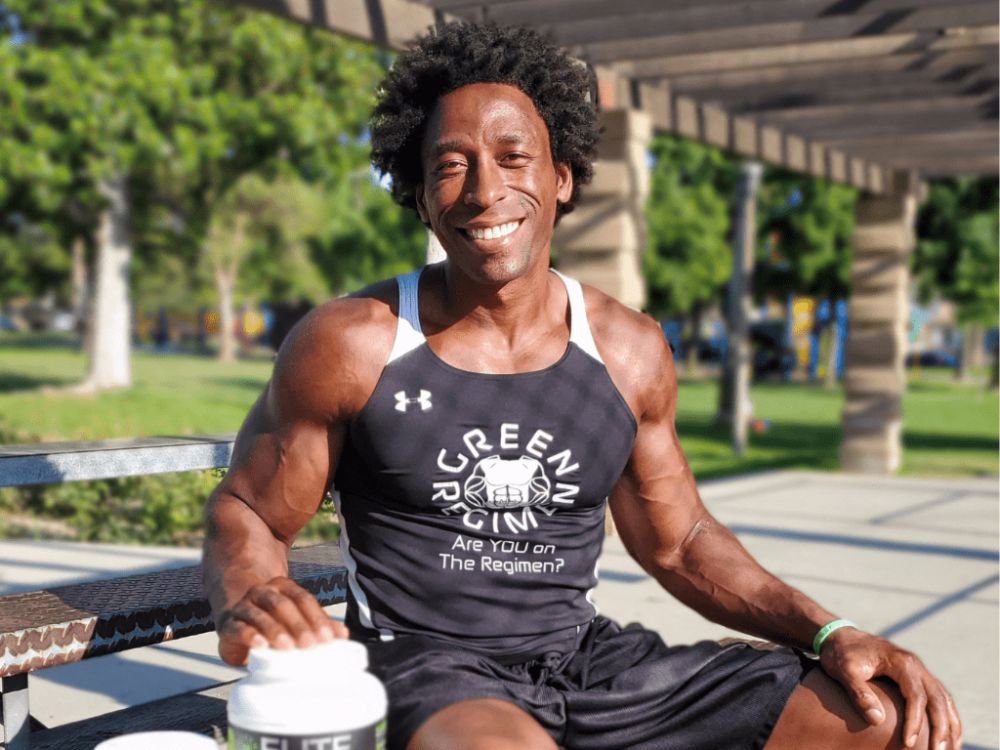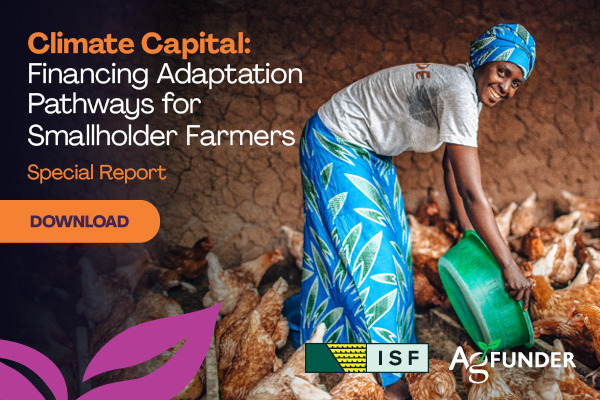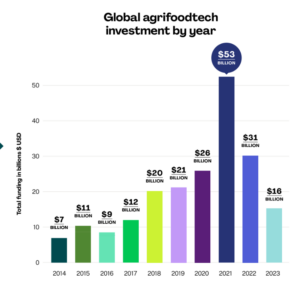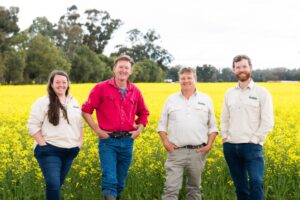Tyshawn Bryant never imagined he would become the founder of a nutritional supplement company, let alone one that makes plant-based protein powder.
His journey from personal trainer to CEO of Los Angeles-based Green Regimen has taken more than 10 years, beginning with a humble green smoothie and a few YouTube videos about nutrition and its role in fighting chronic health issues like obesity and diabetes.
Green Regimen today sells a powdered supplement made entirely from plant-based ingredients, direct to consumers via its e-commerce shop. The idea is to combine the robust nutritional profile of traditional whey powders — which generally contain animal protein — with a taste that’s superior to the plant-based offerings currently available.
To date, Green Regimen has been self-funded; it’s in the midst of its initial round of seed funding. Read on to hear more from Bryant (TB).
AFN: Explain how you first got the idea to go from making smoothies to selling an actual product to the public.
TB: I’ve been a nutritionist and personal trainer for 20-plus years, but never did I ever think that I would have a supplement company, never mind plant-based, because I was the biggest meat eater you’ve ever met. In 2010 my mom got cancer, and even when you’re in the health and nutrition field, you don’t exactly know what to do or how to care for someone when you hear that they have cancer.
I immediately started researching, and all of the foods that I came up with had to do with micronutrients, and you get the micronutrients in greens. So I started making her green smoothies and learning the entire nutrient density of smoothies. She lost a bunch of weight, the cancer never came back. And at that point it was more of an emotional thing. I felt really helpless at the time, and I didn’t want anyone else to feel that, so I figured if I could show people a simple and convenient way that I helped her, then they can do the same.
At that point, I transitioned over into making [educational] videos for people on YouTube and that was a hobby, not a business. But people loved the videos and were like, “Hey, Ty, do you have something more convenient?” And then it hit me. You know what? Product. I can have a product that can combine the micronutrients that I used to help [my mom] but also it can serve as a meal replacement because it has a complete protein complex. But I wanted it to be plant-based because that’s the type of foods that I gave her, and then later on I transitioned to being 100% plant-based as well.
AFN: What went into creating a powder that overcomes some of the normal taste issues associated with plant-based protein powders?
TB: The first plant-based products I tried, I would add them into [mom’s] smoothies and they just tasted like dirt. I started looking at the ingredients. A lot of them were using different forms of plant protein – brown rice protein, or maybe it was 100% pea protein. So I just started mixing combinations myself and later I hired a few formulators to help me. It’s one thing if you have an idea and all these different recipes, but in order to make a product shelf-stable you have to hire people who are smarter than you in the field.
Pretty much what I did was gathering customer feedback. Customers didn’t like the grittiness. Sometimes they would have intense stomachaches from just plant-based proteins, and I learned that’s sometimes the quality of pea protein used. Another issue plant-based proteins have when you’re tracking customers who are fitness-intensive is that whey protein has a complete amino acid profile. Plant-based does not. Further research informed me that if you combine your plant proteins, you can have a plant-protein that’s comparable to whey. So I combined the hemp and the pea protein, and that’s where mine wins out because of the smooth texture.
With the taste, I thought I was going to do stevia initially. Talking to customers, they were like, “We don’t like stevia.” I decided to use dehydrated coconut water. It is more expensive, but the ingredients that I was using were already expensive, so I said why not. Then I added the micronutrients: spirulina, macha, chia seed.
You can have a product that’s great and you think you know everything about it, but the consumer is the person who’s going to be buying. That’s who you must listen to.
AFN: How long did it take to develop the product and arrive at this point?
TB: I failed at my first product. It was a 100% greens powder for kids. Because I figured, well, obesity is always linked to cancer, so I said, “Why not try to get to the kids and introduce them to a product prior to them becoming an adult and becoming obese?” I failed because I didn’t really know how to market that product. But I had a lot of ingredients in there. And I learned how to create the synergistic effect between ingredients.
After failing with that product, I decided I didn’t necessarily need 1,000 ingredients, I just needed the correct ingredients. So when I segued to the plant-based powder, I chose just 18 to 19 different ingredients because I knew from there I could have the complete meal-replacement aspect of our product.
It took a good year [from 2014] to find a manufacturer who would work with us because we were doing very small runs. And another year-and-a-half to actually have this formulation that you taste now.
AFN: Who are you targeting nowadays in terms of the consumer?
TB: Initially it was everyone. You quickly learn that there is a core customer base. And usually it’s women and men between the ages of 25 and 45 who are active, not necessarily vegan, who are OK with their health but always want to improve it.
The gym-goers are still 100% for whey protein, but we do have a strong fitness community due to the fact that there’s more information coming out about the plant-based lifestyle.
AFN: You’re selling direct to consumers. Is there an eventual plan to get on more retail shelves?
TB: We are in retail here in Los Angeles and in a few small retail stores across the US, primarily at a store called Air One.
We’ve been courted by Whole Foods and Sprouts. I haven’t been able to finalize those agreements because we just need to increase our staffing. So with the [seed] investment, that’s exactly what we’re going to do. So that’s our immediate go-to-market strategy: on a big scale. Whole Foods is gigantic so that’s exactly where we need to be.
AFN: Where are you at with your seed round?
TB: We started our investor outreach five weeks ago, so now we’re currently looking for a lead. We have a few investors interested right now. Once we get the lead we can close our first round, or at least get very close.
AFN: As more companies add the “plant-based” label to their products, do you see Green Regimen’s plant-based protein powder as being similar to food companies, or in a different category?
TB: I would definitely say that we are different. If you notice now, there’s a lot of companies that are plant-based but they are combining a lot of technology, a lot of micro-organisms, to have products that look exactly like what they are trying to replace.
When it comes to our powder, we’re just much more flexible because you can have a big meat eater who says, “This protein powder, let me give it a try.” Once they try it, they actually feel the healthiness. Once consumers find some of the benefits they can relate those benefits to a problem they have or a problem a loved one has.
AFN: You’re big on consumer education. Tell us how that can help folks make the switch to plant-based products.
TB: I think the educational component is what makes a company last. A lot of my competitors, they were bought out by big dairy companies because they had a built-in customer base. What I’ve noticed is, there’s really no education or information [about the products] other than “this is plant based.”
When I take the time to educate someone, it’s almost like an epiphany. There’s much more to this than it just being plant-based. The [typical] vegan diet itself is not a very healthy diet at all. Some animal diets could be a little healthier than some vegan diets. It’s all about the type of plant-based diets that you’re eating. That’s where the education comes in. I know education for a business is very expensive, but nowadays that’s how you build the trust with the customer.

















Sponsored
International Fresh Produce Association launches year 3 of its produce accelerator